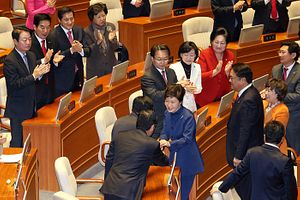A schism is developing between President Park Geun-hye and Saenuri Party Chairman Kim Moo-sung.
While the possibility of a Blue House-ruling party divide first emerged when Kim Moo-sung was elected to the position of party chair over “the godfather of the pro-Park” faction, Suh Chung-won, latent tension between Park and Kim has come seeping through the cracks over the last couple of weeks.
The current divide is ostensibly about reforming South Korea’s political system. During his recent visit to China, Kim Moo-sung announced there would be serious talk among lawmakers at the end of the current legislative session (in December) over a constitutional amendment. The amendment, supported by about 150 lawmakers, would significantly reduce the power of the president by installing a semi-presidential system (South Korea is currently a presidential system, where a substantial amount of power is vested in the presidency).
Predictably, the announcement provoked the ire of the Blue House. Despite Kim apologizing “for bringing up the topic of changing the Constitution,” a Blue House source told the Joongang Ilbo that he believes Kim’s comments were made with the intention of stirring the political pot; in other words, this is about power.
The president has pushed for the passage of a public sector pension reform bill and believes that discussion of constitutional reform will only distract from efforts to reform the public pension system, which some see as “a ticking time bomb.” Kim’s comment is perceived to be a challenge to the president’s authority.
Indeed, it probably is.
Since rising to the position of party chair, Kim has played a very active role in the party and is seen as a likely contender for president in 2017. Kim’s sound defeat of Suh for the position of chair (he won by a margin of 8.1%) has put him into a strong position vis-à-vis other lawmakers and the president herself. His trip last week to China, which included a meeting with Xi Jinping, could surely be interpreted (as it is in the Joongang article cited above) as a move to shore up support for a presidential run.
Notably, this is not the first time Kim and Park have been at loggerheads. Kim left the so-called “pro-Park” faction in 2009 over Park’s plan to designate Sejong City a special administrative city. And despite pledges to the contrary, Kim has not been very supportive of President Park’s agenda since taking over as chair. His vocal support for a constitutional amendment is just one example.
A public opinion poll from earlier this year (before his election to party chair) found Kim Moo-sung as the second most popular potential candidate for president in 2017, behind only Seoul Mayor Park Won-soon. That isn’t good news for President Park.
It is far from a given, however, that Kim has the requisite support within the ruling party to mount a successful challenge to President Park’s rule. In fact, on Thursday Seanuri lawmaker Kim Tae-ho, from the Saenuri supreme council, resigned from his position in what is being interpreted as a protest of Kim’s unwillingness to push through economic stimulus legislation, something the president supports.
As I indicated over the summer, Kim’s election to the position of chair would bring about a reconfiguration of government-party relations. Whether this reconfiguration leads to party infighting à la the South Korean Left or eventually results in compromise is hard to say.

































